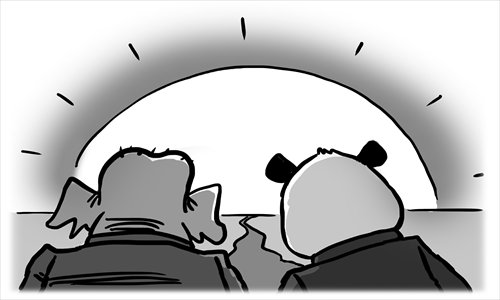Year of friendship solidifies Beijing-New Delhi ties

Illustration: Liu Rui/GT
Since Chinese Premier Li Keqiang visited India in May, the bilateral relationship between China and India has been gaining momentum. This year is the 60th anniversary of the statement of the Five Principles of Peaceful Coexistence jointly made by both countries, and it is also the "Year of China-India Friendly Exchanges."
Echoing the positive trend, the 17th special representatives' meeting for the boundary question and the annual defense and security consultation also came to a successful end, with several agreements concluded in terms of border issues, joint drill and military exchanges.
This year will also see both nations start a few rounds of economic and strategic talks. The interactions between both sides have been highly institutionalized.
The leaderships of China and India have drawn lessons from the past, and determined to make peaceful interactions prevail over confrontation when dealing with controversial issues such as the border problem.
Both sides have reached a consensus to control the elements that might trigger tensions, and make sure the situation along the border is basically peaceful and stable.
Peaceful and friendly cooperation is a positive factor in the changing international situation. In the international sphere, strategic talks between China and India can empower both countries as well as other developing nations to have a bigger say in global issues.
Emerging economies including India have been shaken by the global financial crisis, which has weakened their influence in the reform of global governance.
Only by forming a united frontline can emerging economies acquire more respect from the West and shape the governance structure to be globally beneficial.
China and India face tough geopolitical issues together. The US troops' withdrawal from Afghanistan will create more threats for India and China, which are both neighbors of a country that is still blighted by the trauma of war.
Whether Afghanistan can remain stable in its post-US period will be critical to India and China in terms of security and social stability.
China and India must strengthen their mechanism of coordination and consultation, and work together with other neighbors such as Pakistan, Russia, Iran and Central Asian countries to promote reconciliation among different political factions within Afghanistan.
China will be helpful in boosting the slowing Indian economy. So far there has been progress in some major projects, such as the Bangladesh-China-India-Myanmar economic corridor and the Chinese industrial parks located in India.
If the next Indian administration is willing to draw more investment from China, it can become a major step to facilitate India's economic growth and the economic cooperation between China and India.
These moves can indicate that the positive momentum of China-Indian relations will continue in the future.
Nonetheless, this doesn't mean both sides should completely set aside the risk that some people within India and in the international community are unwilling to see the improvement of bilateral relations.
Those who can benefit from the tensions between China and India, such as the Indian military, some Indian strategists and some politicians in the US and Japan, will continue posing a threat to the Sino-Indian relationship.
The relations between the two countries should not fall victim to India's partisan conflicts either.
Narendra Modi, the Bharatiya Janata Party's candidate for prime minister, recently delivered a provocative speech in the disputed area. Votes cannot be won at the cost of the future of the Sino-Indian relationship. The mutual trust between both nations can only be built step by step, and the loss of ruining the trust will far outweigh the petty benefits acquired through it.
The author is an assistant research fellow of Shanghai Institutes for International Studies. opinion@globaltimes.com.cn